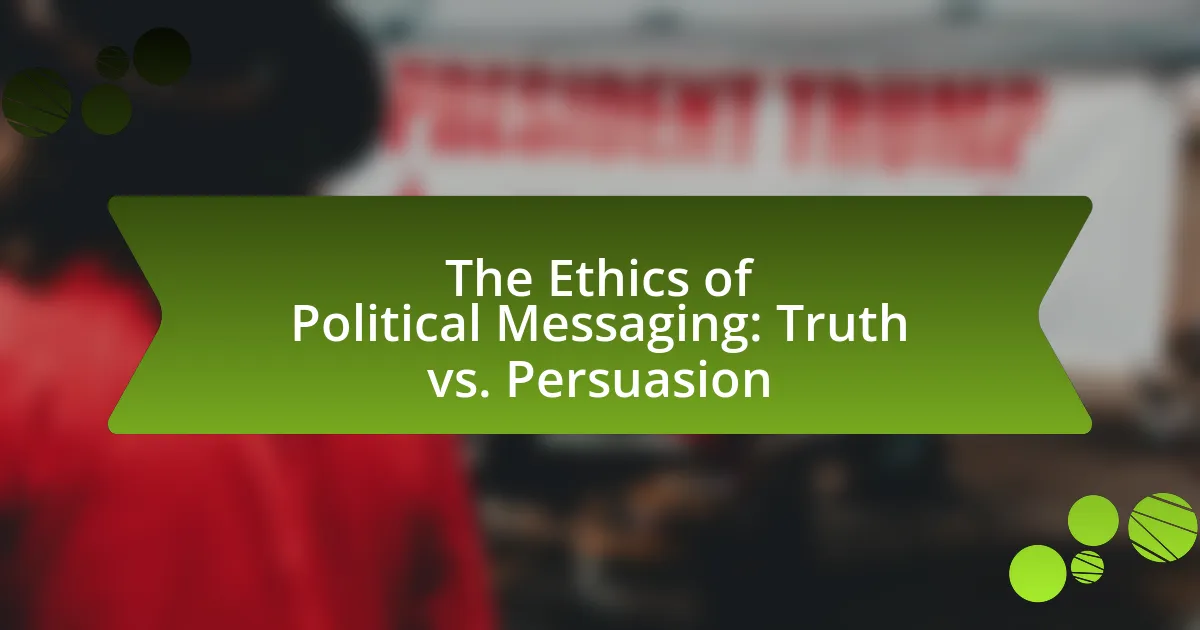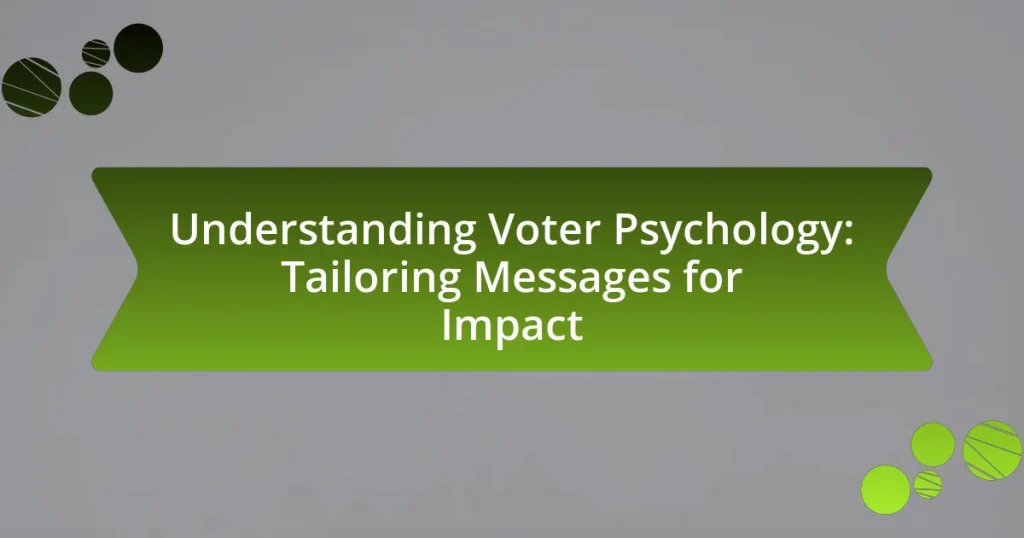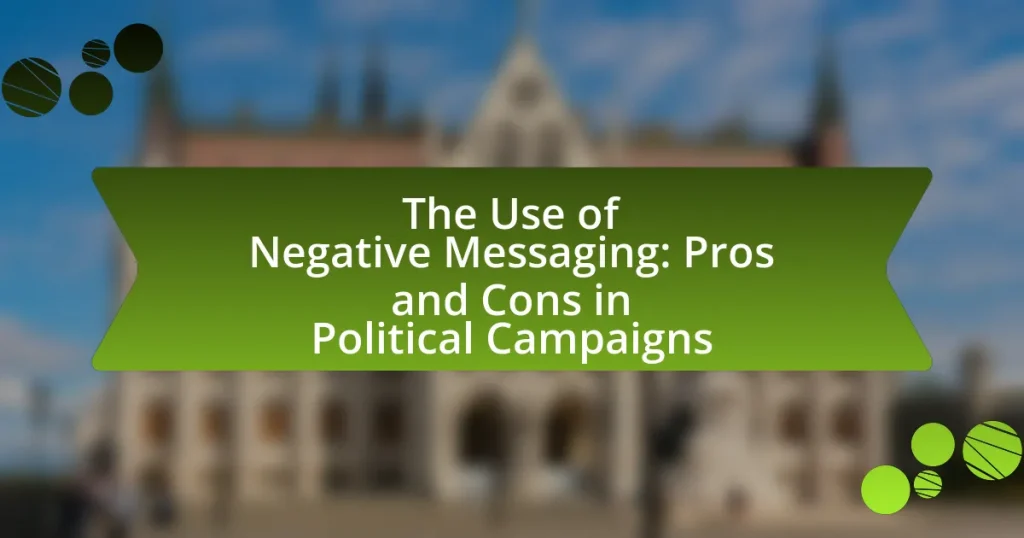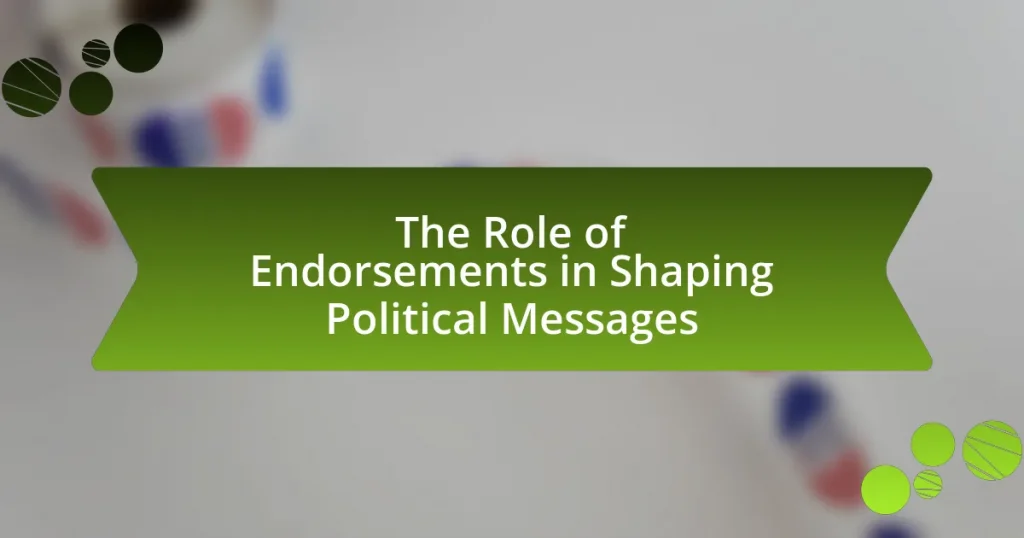The article examines the ethics of political messaging, focusing on the interplay between truth and persuasion. Key concepts discussed include truthfulness, transparency, manipulation, and accountability, which are essential for ethical communication in politics. The article highlights the importance of honesty in fostering public trust, the ethical application of persuasion, and the consequences of unethical messaging. It also explores various approaches to political messaging, the influence of political ideologies, and the role of technology in shaping ethical standards. Practical tips for enhancing ethical political messaging are provided, emphasizing transparency, accuracy, and inclusivity.
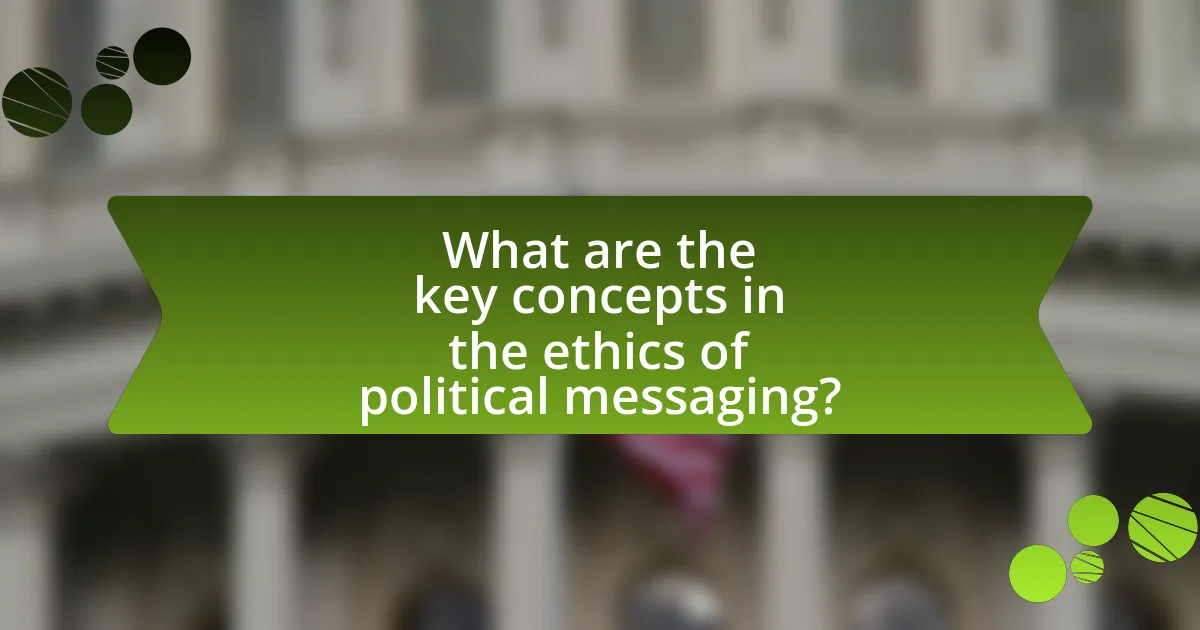
What are the key concepts in the ethics of political messaging?
The key concepts in the ethics of political messaging include truthfulness, transparency, manipulation, and accountability. Truthfulness refers to the obligation of political communicators to provide accurate information, as misleading messages can distort public understanding and trust. Transparency involves openly sharing the sources and intentions behind political messages, which fosters informed decision-making among the electorate. Manipulation highlights the ethical concerns surrounding tactics that exploit emotions or cognitive biases to sway opinions, often at the expense of rational discourse. Accountability emphasizes the responsibility of political actors to answer for their messaging choices, ensuring that they adhere to ethical standards and can be held liable for misinformation. These concepts are critical in navigating the balance between persuasion and ethical communication in political contexts.
How do truth and persuasion interact in political messaging?
Truth and persuasion in political messaging interact by influencing how messages are received and interpreted by the audience. When political messages are grounded in truth, they tend to foster trust and credibility, which enhances persuasive effectiveness. Conversely, messages that prioritize persuasion over truth can lead to misinformation, eroding public trust and potentially causing long-term damage to the political discourse. Research indicates that voters are more likely to support candidates who present factual information, as seen in studies by the Pew Research Center, which found that 70% of Americans value honesty in political leaders. Thus, the balance between truth and persuasion is crucial for ethical political communication.
What role does honesty play in political communication?
Honesty is fundamental in political communication as it fosters trust between politicians and the electorate. When political figures communicate honestly, they enhance their credibility and encourage informed decision-making among voters. Research indicates that voters are more likely to support candidates who are perceived as truthful; for instance, a study by the Pew Research Center found that 70% of Americans believe that honesty is a crucial quality for political leaders. This trust not only influences electoral outcomes but also strengthens democratic processes by promoting transparency and accountability.
How can persuasion be ethically applied in political contexts?
Persuasion can be ethically applied in political contexts by prioritizing transparency, honesty, and respect for the audience’s autonomy. Ethical persuasion involves presenting factual information, acknowledging opposing viewpoints, and avoiding manipulative tactics that distort the truth. For instance, political campaigns that provide clear evidence for their claims, such as citing reputable studies or statistics, demonstrate ethical persuasion. Research indicates that voters respond positively to candidates who engage in honest dialogue and provide verifiable information, as seen in studies conducted by the Pew Research Center, which highlight the importance of trust in political communication.
Why is ethical political messaging important?
Ethical political messaging is important because it fosters trust and accountability in democratic processes. When political messages are grounded in truth and integrity, they enable voters to make informed decisions based on accurate information. Research indicates that misinformation can lead to voter apathy and disengagement, undermining the democratic process. For instance, a study by the Pew Research Center found that 64% of Americans believe fabricated news stories cause confusion about basic facts, highlighting the necessity for ethical standards in political communication.
What are the potential consequences of unethical political messaging?
Unethical political messaging can lead to significant consequences, including the erosion of public trust in political institutions. When politicians or parties engage in misleading or deceptive communication, it undermines the credibility of the political system, as evidenced by studies showing that misinformation can decrease voter turnout and increase polarization among the electorate. Additionally, unethical messaging can incite social unrest, as seen in various historical contexts where propaganda fueled division and conflict. The manipulation of facts can also result in harmful policy decisions, as public opinion may be swayed by false narratives rather than informed debate.
How does ethical messaging influence public trust in politics?
Ethical messaging significantly enhances public trust in politics by promoting transparency and accountability among political figures. When politicians communicate honestly and uphold ethical standards, they foster a sense of reliability and integrity, which is crucial for building trust. Research indicates that voters are more likely to support candidates who engage in ethical messaging, as it aligns with their expectations for honesty in political discourse. For instance, a study published in the Journal of Political Marketing found that ethical communication positively correlates with voter confidence and engagement, demonstrating that ethical messaging not only influences perceptions but also impacts electoral outcomes.
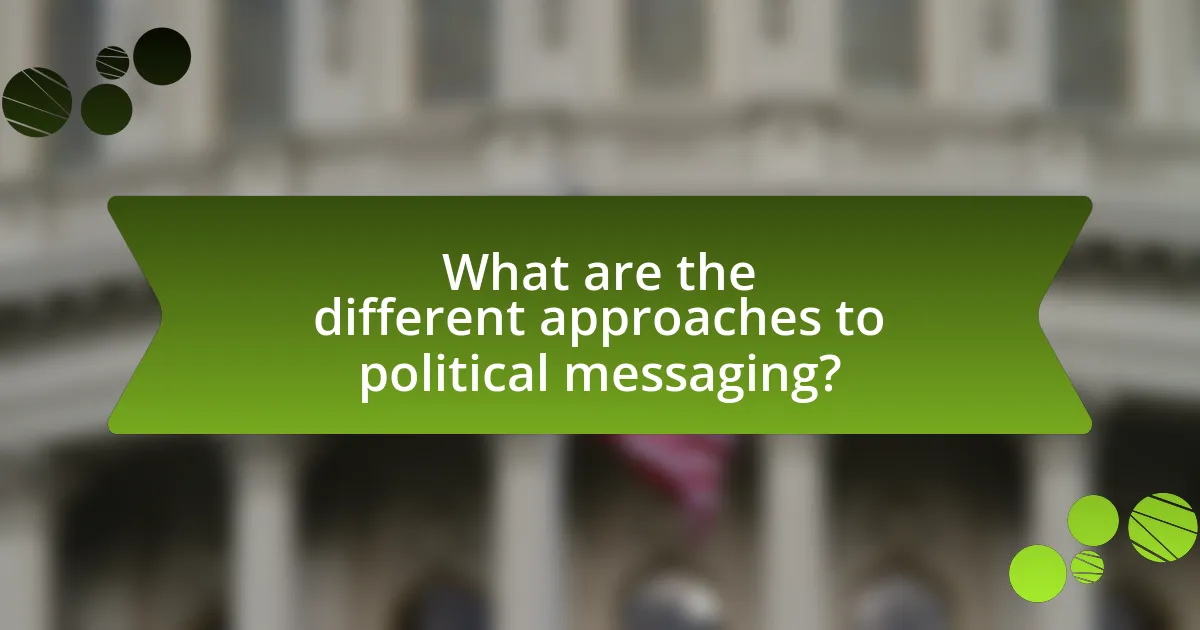
What are the different approaches to political messaging?
Different approaches to political messaging include emotional appeals, factual arguments, narrative framing, and targeted communication strategies. Emotional appeals leverage feelings to connect with voters, often using stories or imagery to evoke empathy or fear. Factual arguments focus on presenting data and evidence to support a political stance, aiming to persuade through logic and reason. Narrative framing involves constructing a storyline that shapes how issues are perceived, influencing public opinion by contextualizing facts within a relatable narrative. Targeted communication strategies utilize demographic data to tailor messages to specific audiences, enhancing relevance and engagement. Each approach has distinct implications for ethical considerations in political messaging, particularly regarding the balance between truth and persuasion.
How do various political ideologies shape messaging strategies?
Various political ideologies shape messaging strategies by influencing the values, narratives, and emotional appeals used in communication. For instance, liberal ideologies often emphasize social justice and equality, leading to messaging that highlights inclusivity and progressive change, as seen in campaigns advocating for civil rights. Conversely, conservative ideologies typically focus on tradition and stability, resulting in messaging that underscores law and order, personal responsibility, and national pride, as evidenced in campaigns that prioritize economic growth and family values. Additionally, populist ideologies may employ messaging that appeals directly to the emotions of the masses, often using rhetoric that frames the political elite as out of touch with ordinary citizens, which can be observed in various populist movements worldwide. These ideological frameworks dictate not only the content of the messages but also the channels and styles of communication employed, shaping public perception and engagement.
What messaging techniques are commonly used by different political parties?
Political parties commonly use techniques such as emotional appeals, framing, repetition, and targeted messaging to influence voters. Emotional appeals engage voters’ feelings, often leveraging fear or hope to motivate action. Framing involves presenting issues in a way that highlights certain aspects while downplaying others, shaping public perception. Repetition reinforces key messages, making them more memorable and persuasive. Targeted messaging utilizes data analytics to tailor communications to specific demographics, increasing relevance and impact. These techniques are evident in various political campaigns, where parties strategically craft their messages to resonate with their intended audiences and achieve electoral success.
How do cultural contexts affect political messaging approaches?
Cultural contexts significantly influence political messaging approaches by shaping the values, beliefs, and communication styles of target audiences. For instance, in collectivist cultures, political messages often emphasize community and social harmony, while in individualistic cultures, messages may focus on personal freedom and individual rights. Research by Hofstede (1980) highlights how cultural dimensions, such as individualism versus collectivism, directly impact how political messages are crafted and received. This indicates that political campaigns must tailor their messaging strategies to align with the cultural norms and expectations of their audience to be effective.
What are the ethical dilemmas faced in political messaging?
Ethical dilemmas in political messaging primarily revolve around the tension between truth and persuasion. Politicians and their campaigns often face the challenge of balancing the need to convey accurate information with the desire to persuade voters, which can lead to the dissemination of misleading or exaggerated claims. For instance, the use of emotional appeals can overshadow factual accuracy, as seen in various political advertisements that prioritize impactful messaging over truthful representation. This dilemma is further complicated by the potential for misinformation to spread rapidly through social media, raising questions about accountability and the ethical responsibility of political actors to ensure their messages are truthful.
How do misinformation and disinformation challenge ethical standards?
Misinformation and disinformation challenge ethical standards by undermining the principles of honesty and integrity in communication. These forms of false information can manipulate public perception and decision-making, leading to a breakdown of trust in institutions and media. For instance, a study by the Pew Research Center found that 64% of Americans believe that fabricated news stories cause confusion about the basic facts of current events, illustrating the detrimental impact on informed citizenship. This erosion of trust not only affects individual beliefs but also compromises the ethical responsibility of communicators to provide accurate information, thereby creating a significant ethical dilemma in political messaging.
What are the implications of emotional appeals in political messaging?
Emotional appeals in political messaging significantly influence voter behavior and decision-making. These appeals can enhance engagement and create a strong connection between the message and the audience, often leading to increased support for a candidate or policy. Research indicates that emotionally charged messages are more memorable and can sway opinions more effectively than purely factual arguments. For instance, a study published in the journal “Political Psychology” by Brader (2006) found that emotional content in campaign ads can lead to higher levels of voter turnout and stronger party identification. Thus, the implications of emotional appeals are profound, as they can shape public perception and electoral outcomes while raising ethical concerns about manipulation and misinformation.
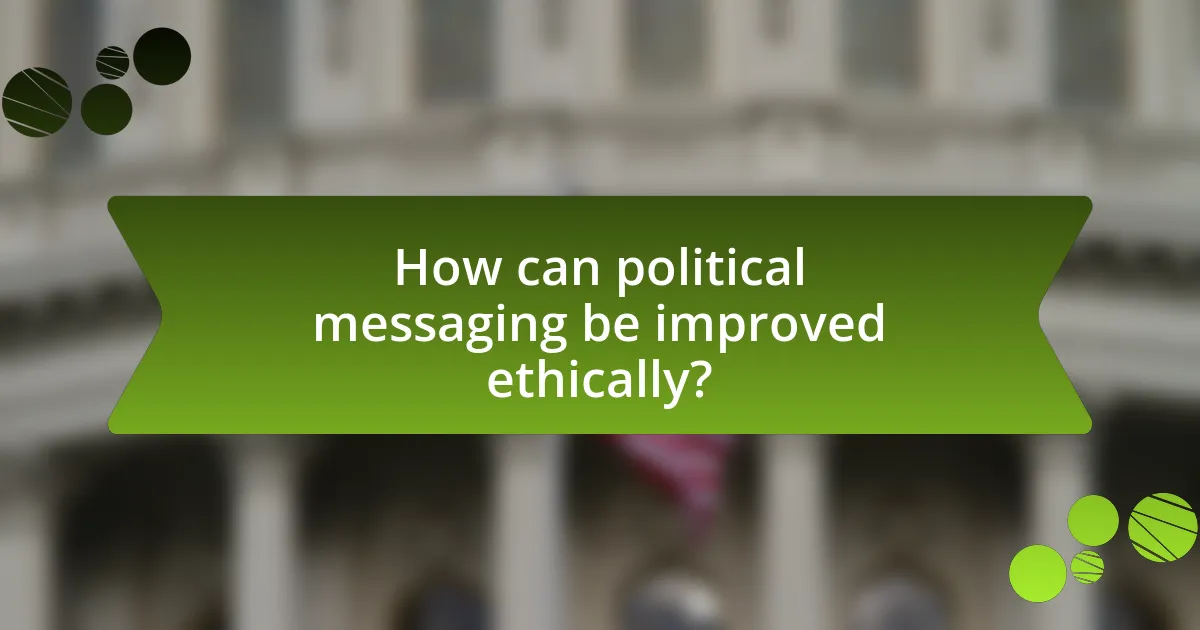
How can political messaging be improved ethically?
Political messaging can be improved ethically by prioritizing transparency and factual accuracy. Ensuring that all claims made in political messaging are backed by verifiable data fosters trust and accountability among constituents. For instance, studies show that voters are more likely to engage with campaigns that provide clear evidence for their assertions, such as citing reputable sources or statistical data. Additionally, implementing fact-checking mechanisms during the campaign process can help mitigate the spread of misinformation, as demonstrated by organizations like PolitiFact, which evaluates the truthfulness of political statements. By adhering to these practices, political messaging can maintain integrity while effectively communicating with the public.
What best practices should be followed for ethical political messaging?
Ethical political messaging should prioritize honesty, transparency, and respect for the audience. Political campaigns must ensure that all claims are fact-checked and supported by credible sources to avoid misinformation. For instance, the American Association of Political Consultants emphasizes the importance of truthfulness in political advertising, stating that misleading information can undermine democratic processes. Additionally, respecting diverse viewpoints and engaging in constructive dialogue fosters a more inclusive political environment. Research from the Pew Research Center indicates that voters value authenticity and integrity, which can enhance trust in political messaging.
How can transparency be enhanced in political communication?
Transparency in political communication can be enhanced by implementing clear and accessible information-sharing practices. This includes the use of plain language in public statements, regular updates on policy decisions, and the establishment of open channels for public feedback. Research indicates that when political entities provide detailed explanations of their actions and decisions, public trust increases; for instance, a study by the Pew Research Center found that 70% of Americans believe that transparency in government leads to greater accountability. Additionally, utilizing digital platforms for real-time communication can further promote transparency by allowing citizens to engage directly with political representatives and access information easily.
What role does fact-checking play in ethical messaging?
Fact-checking plays a crucial role in ethical messaging by ensuring that information disseminated to the public is accurate and reliable. This process helps to maintain the integrity of communication, particularly in political messaging, where misinformation can significantly influence public opinion and decision-making. For instance, a study by the Pew Research Center found that 64% of Americans believe that fact-checking helps them better understand political issues, highlighting its importance in fostering informed citizenry. By verifying claims and providing context, fact-checking not only enhances transparency but also holds communicators accountable, thereby promoting ethical standards in messaging.
What tools and strategies can enhance ethical political messaging?
Tools and strategies that can enhance ethical political messaging include transparency, fact-checking, and audience engagement. Transparency involves openly sharing sources and motivations behind messages, which builds trust with the audience. Fact-checking ensures that the information disseminated is accurate and reliable, reducing the spread of misinformation. Audience engagement strategies, such as soliciting feedback and fostering dialogue, create a two-way communication channel that respects the audience’s perspectives and promotes informed decision-making. Research indicates that campaigns employing these strategies are more likely to resonate positively with voters, as they align with ethical standards and enhance credibility.
How can social media be used responsibly in political messaging?
Social media can be used responsibly in political messaging by prioritizing transparency, fact-checking, and respectful discourse. Transparency involves clearly disclosing the sources of information and funding for political campaigns, which builds trust with the audience. Fact-checking ensures that the information shared is accurate, reducing the spread of misinformation; for instance, platforms like Facebook have implemented third-party fact-checking to verify claims made in political ads. Respectful discourse encourages constructive dialogue rather than divisive rhetoric, fostering a healthier political environment. These practices contribute to ethical political messaging that aligns with democratic values and informed citizen engagement.
What are effective ways to engage audiences without compromising ethics?
Effective ways to engage audiences without compromising ethics include transparent communication, fostering open dialogue, and prioritizing factual accuracy. Transparent communication builds trust, as audiences appreciate honesty about intentions and sources. Fostering open dialogue encourages participation and allows diverse viewpoints, which enhances understanding and respect among differing opinions. Prioritizing factual accuracy ensures that the information shared is reliable, reducing the risk of misinformation and maintaining credibility. Research indicates that ethical engagement leads to higher audience retention and trust, as seen in studies by the Pew Research Center, which highlight that audiences are more likely to engage with content that is perceived as truthful and respectful.
What are the future trends in ethical political messaging?
Future trends in ethical political messaging will increasingly focus on transparency, authenticity, and the use of data-driven strategies to engage voters. As public skepticism towards political communication rises, campaigns will prioritize clear and honest messaging to build trust. Research indicates that voters are more likely to support candidates who demonstrate integrity and accountability, as seen in the 2020 U.S. elections where candidates emphasizing transparency gained favor. Additionally, advancements in technology will enable more personalized communication, allowing political messages to resonate with specific demographics while maintaining ethical standards. This shift towards ethical practices is supported by studies showing that ethical messaging can lead to higher voter engagement and satisfaction.
How might technology influence the ethics of political communication?
Technology significantly influences the ethics of political communication by enabling rapid dissemination of information, which can blur the lines between truth and misinformation. The rise of social media platforms allows for instant sharing of political messages, often without fact-checking, leading to the spread of false narratives. For instance, a study by the Pew Research Center found that 64% of Americans believe that fabricated news stories cause confusion about the basic facts of current events. This environment challenges ethical standards, as political actors may prioritize persuasive tactics over factual accuracy to gain attention and influence public opinion.
What emerging challenges could affect ethical standards in political messaging?
Emerging challenges that could affect ethical standards in political messaging include the rise of misinformation, the use of artificial intelligence in content creation, and the increasing polarization of political discourse. Misinformation undermines trust in political messaging, as seen during the 2016 U.S. presidential election, where false narratives spread rapidly on social media platforms. The use of artificial intelligence can lead to the creation of deepfakes and manipulated content, which complicates the ability of voters to discern truth from deception. Additionally, the polarization of political discourse can create echo chambers, where individuals are exposed only to information that reinforces their beliefs, further eroding ethical standards in communication. These challenges collectively threaten the integrity of political messaging and the public’s ability to make informed decisions.
What practical tips can be applied for ethical political messaging?
Practical tips for ethical political messaging include prioritizing transparency, ensuring accuracy, and promoting inclusivity. Transparency involves clearly disclosing sources of information and funding, which builds trust with the audience. Accuracy requires verifying facts before dissemination, as misinformation can lead to public distrust and harm democratic processes; for instance, a study by the Pew Research Center found that 64% of Americans believe fabricated news stories cause confusion about basic facts. Promoting inclusivity means representing diverse perspectives and engaging with various community voices, which fosters a more comprehensive understanding of issues and encourages civic participation.
